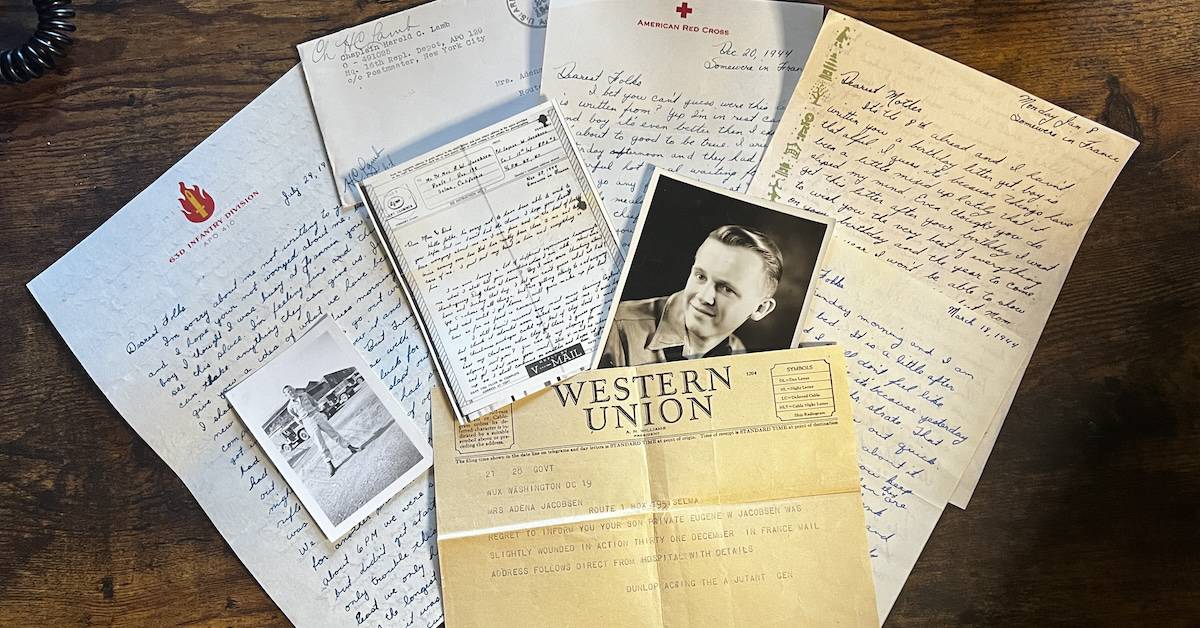During the Christmas break, I spent some time with my nineteen-year-old dad.
Our family recently discovered letters my father wrote home to his parents when he went off to join the army during World War II. They begin with his basic training and follow his journey through Texas to Maryland to England, to the front in France, back to England for surgery, and then to France again before boarding a ship that took him through the Panama Canal to the Philippines, where he served out his time.
All told, he was in the service from February 1944 until April 1946. Hundreds of letters chronicled his thoughts, hopes, and disappointments as he left his family’s farm fresh out of high school and headed for a world war raging in Europe and the South Pacific. I had no idea these letters even existed. While Dad told endless stories from his war experiences throughout his lifetime, this was the first time I had known of them. What a treasure trove of a young man’s thoughts at a pivotal time in history!
I got to see what it was like for him to leave everything familiar at eighteen and go off to distant lands during war. It was quite a ride watching him endure the challenge of military life that interrupted his own. This was an adventure filled with uncertainty for a boy who had never traveled more than 300 miles from home and had no aspirations for world travel. He was a cog in a great war machine, without control over his present or future. He was being trained to kill and then sent to the front, helping push Germany out of France. On the front for just over twenty days, he was wounded and sent to a hospital near Paris. When he finally recovered, Germany had already surrendered, and he was sent to the Philippines. There, he was assigned MP duty near Manila, which he found embarrassing. He only wanted to be known as an infantryman.
Though I’d heard most of his stories before, this was more intimate. He celebrated fried chicken wherever he could find it, thought about girls more than I thought he would tell his mom about when there were so few even around, expressed concern that he couldn’t help his dad in the vineyard, especially during harvest, and vented his ongoing frustration with the military bureaucracy. He mentions his dog, Ozzie, in every letter, worried she’d be bored without him. His camaraderie with those in his squad continued long after they were separated. His anxiety about going to war was obvious, even as he tried to hide it so his mom wouldn’t worry about him. There was even a telegram notifying his parents that he’d been wounded in battle, though not seriously, and they would get more details later.
He also referred to life as it went on back home. Relatives and friends got married, passed away, and his dad’s raisin crop was damaged by rain. He tried to keep up with his classmates who were finding their way into other branches of the military or could not serve due to physical limitations. As terrified as Dad was of going to war, staying home in the face of such a great conflict would have been humiliating to him.
He also wrote about his hunger to know God, which increased dramatically in times of uncertainty or danger and then seemed to wane when he was bored and the peace had been won. It would be another twenty years before that passion would re-ignite as he began a search for a real God. He didn’t want to raise his boys in “the faith” if Jesus wasn’t any more real than Santa Claus. One night in his early forties he prayed, “If you’re real, show me?” Some months later, God did, and Jesus became the relentless passion of his life to the end of his days.
He passed away last summer at ninety-eight. Reconnecting with his younger self made me admire him all the more. You can see the seeds of spiritual hunger, personal character, courage in the face of fear, and passion for family and friendships that would blossom over a lifetime.
It was special reading all these letters at year’s end. It not only allowed me to know my dad better but also the chance to reflect on my own journey and how Jesus drew me to himself at such a young age and has walked with me, both when I’ve been aware of him and during seasons when I was more distracted.
His faithfulness doesn’t depend on mine. It never has.









Pingback: Connecting with my Nineteen-Year-Old Dad | Lifestream – The Faith Herald
I love this , sounds like good reading. I came into possession of some of my dad’s letters after he passed on and they are precious.
You could publish these with thoughts of your own, you have the talent.
I agree and hope you consider publishing these Wayne. We discovered letters my husband’s dad wrote to his friend during WWII. He signed each letter with, “Your Pal Merle.” Our daughter, Jansina, typed out the letters and published a book with the hand-written letter across from the more legible typed letter. She also included pics of her grandpa and his life-time friend as children, young adults, through their eighties. Her intent was to create a gift to the family but hundreds of other have purchased this book as it is a bit of history. e.g. he talks about using his helmet when he was sea sick. I’d love to read your dad’s stories.
I’m not sure at this point the family wants to do that. We are publishing some of the most interesting letters in a book for family members, but I think that’s all at this point. We may donate them to a World War II Archive if we find one interested.
I am thrilled to read this Wayne. How precious those letters must be for you and for those that will carry on the family name. Love your perspective on them; in my book your dad was an American hero, much like mine.
Cheers,
Jack
Precious thank you Wayne!
What a lovely legacy of details to cherish and share with humanity.